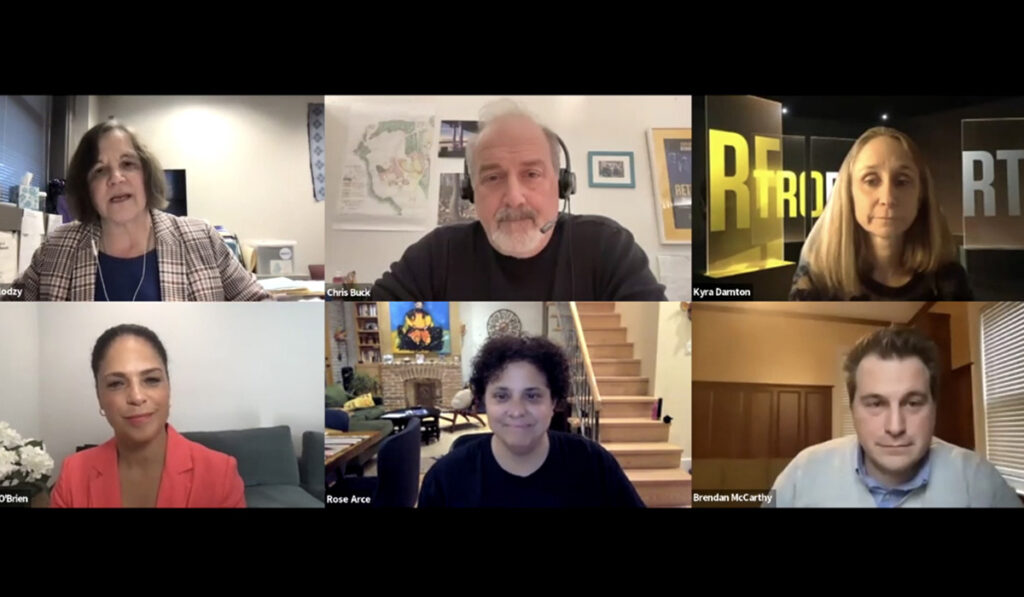Journalism Dialogue Tackles Truth, Diversity, and Moving the Industry Forward

How do journalists tell good stories? Meaningful stories? How do they get a story “with legs” to truly run? Christopher Buck ‘83, founder of Retro Report, answered this question in a simple phrase: We can’t surrender the digital platform to subpar journalism.
Buck shared this insight and many others during the year’s third Journalism Dialogue Series event, which explored how to tell meaningful stories and best serve audiences who are bombarded with overwhelming amounts of information, sources, and stories.
The session featured a panel of award-winning journalists who are making their impacts in the field through digital media platforms of their own creation, and with depth and breadth that surpass industry norms. They included Buck, Kyra Darnton, executive producer of Retro Report; Soledad O’Brien, founder of SO’B Productions; and Rose Marie Arce, executive producer for SO’B Productions, with a cameo from Retro Report team member Teddy Altifois. The conversation was moderated by Brendan McCarthy, the Pulitzer-winning deputy projects editor at the Boston Globe and a guest at the first Journalism Dialogue in September.
The session was followed by a short Q&A where Emerson students and faculty asked panelists questions on consumer choice, creating for the consumer, growing your journalism community, and pushing the envelope with experimental reporting.
On finding the stories to tell:
Christopher Buck: While there is more information available to Americans than ever imagined, the number of news sources has grown, the pace of the news cycle has continued to accelerate, and partisan influence has created a struggle between opinion and truth… Is there a way to look at significant news events from the last 30 years through a longer time lens in order to understand the outcomes of important decisions and how these events from yesterday have propagated into events today?
Kyra Darnton: How do you really see what’s happening as opposed to just what we’re being told? It’s the importance of context and of telling stories that maybe aren’t being told and Soledad, that’s one thing I love so much about your show — you’re doing stories that others are not in the rest of the media.
Rose Marie Arce: The bar is very high now for good journalism. Public officials don’t like the scrutiny of the press and they’ve gotten used to this sort of “access journalism” where they can get reporters to write flattering stuff about them in exchange for these little tiny bits of access.
On diversity in the newsroom:
Soledad O’Brien: We’ve had an amazing advantage in a lot of ways because our staff is very diverse and we’re very overt about that. Often, really great directors want to work with us because they fully get that we do stories on things we care about and we live those very same values.
Brendan McCarthy: Is it too hard to change the [level of diversity] in a large organization?
Soledad O’Brien: No. It’s full-on laziness. Here’s what you need to do to find Black people in journalism: hire Black people in journalism. That’s all it takes. It’s utterly simple.
Rose Marie Arce: While I was at CNN on the Diversity Council, an [executive] openly said, “The problem is, you just can’t find any talented people of color.” Nobody said anything…and I raised my hand and said, “That’s just not true. You have several on your staff..and I bet you they know other people of color who are talented and you could look there. You just have to want to.” There was silence.
Soledad O’Brien: It happens all the time. I cannot tell you how many conversations like that I have been in. It’s just crazy.
On looking back to move forward:
Christopher Buck: Everybody is interested in understanding how the past relates to their lives today, especially in the news environment. The news cycle moves so fast there are so many stories that we never hear the end of. And most of those stories have a current life in another story because all these things do repeat themselves.
Kyra Darnton: Chris has such a long-term view. I can’t tell you how many times I get all worked up and say, “That story didn’t get enough views.” And he is always saying, “Let’s take a look at it five years from now and see how you feel.” And he’s not wrong. Sometimes the story doesn’t hit in that moment…The idea that stories are disposable is wrong. If you pick the right ones…they continue to impact in different ways. And if you can document that and help that evolve over time, I think it is a real service.
Advice for students entering the industry:
Soledad O’Brien: You have to go into the content thinking about it living in multiple spaces. The idea that one piece is going to run one time on one day and “Gee whiz, I hope everybody catches it,” just doesn’t exist anymore. You’re constantly thinking about how something has multiple lives. How you monetize that is the next iteration.
Kyra Darnton: I think you can demand better. You’re making a big decision with what you spend your time watching. Be thoughtful about your choices because I think that is how the industry is going to survive and grow. If we all just let the lowest common denominator win, that’s what we’re going to get more of.
Rose Marie Arce: It’s important the highest bar out there is the one you set for yourself. If you’re going to be engaged in journalism, reward good work and do good work….You can decide to make 14 more phone calls because [you know] there is more to a story. Be like a dog with a bone. People will just sort of a flash story and it’s sexy and cool and then they move on to the next one. That does not have to be the case.
Categories